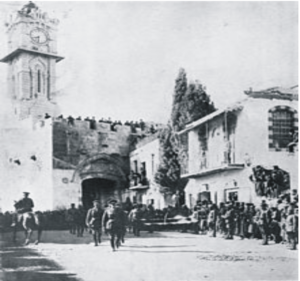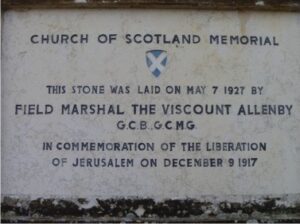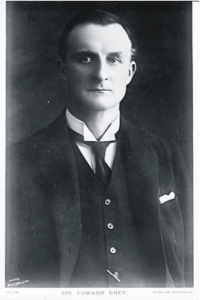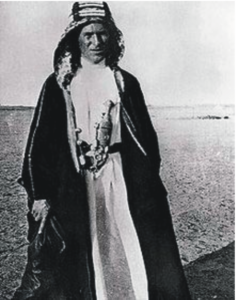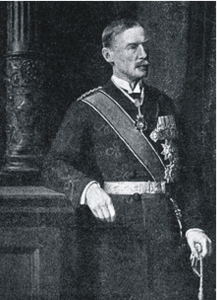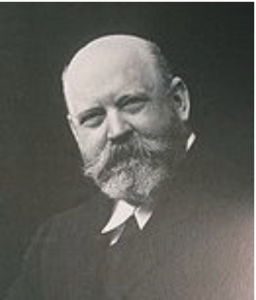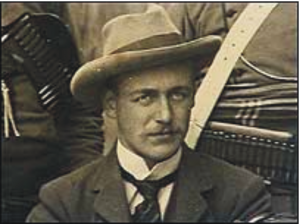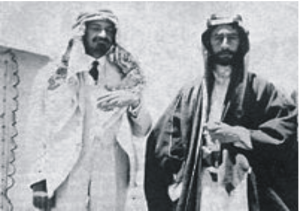The War Cabinet (WW1)
The creation of the War Cabinet undertook the supreme direction of the war effort. It was composed of David Lloyd George, the Prime Minister, Andrew Bonar Law, Lord Nathaniel Curzon, Alfred Milner, Arthur Henderson and Sir Maurice Hankey (its Secretary). Mark Sykes and Leopold Amery were also secretaries.
Allenby, Sir Edmund 1861-1936
He was promoted to general for his distinguished record on the Western Front(WW1) and was sent to Egypt to be made commander-in-chief of the Egyptian Expeditionary Force (EEF) on 27 June 1917. His forces captured Gaza in October, Jerusalem in December and Damascus in October 1918. Although he was a supreme master of cavalry warfare, before entering Jerusalem, Allenby dismounted and together with his officers, entered the city on foot through the Jaffa Gate out of his great respect for the status of Jerusalem as the Holy City important to Judaism, Christianity and Islam.
Allenby Enters Jerusalem
He served as high commissioner for Egypt and the Sudan from 1919 to 1925. On 7 May 1927, he was invited to lay the foundation stone of St Andrew’s Church, Jerusalem – a Church of Scotland building constructed in memory of the Scottish soldiers who fought and died under his command in the region during World War I.
(photo – MG –February 2012)
Asquith, Herbert Henry (First Earl of Oxford and Asquith) 1852-1928
He was a liberal politician: as prime minster from 1908-1916 he led Britain into the First World War with France as ally. However following a Cabinet split on 25 May 1915, caused by the Shell Crisis (or sometimes dubbed ‘The Great Shell Shortage’) and the failed offensive at the 1915 Battle of Gallipoli, Asquith became head of a new coalition government, with David Lloyd George, bringing senior figures from the Opposition into the Cabinet. At first the Coalition was seen as a political masterstroke, as the Conservative leader Bonar Law was given a relatively minor job (Secretary for the Colonies), whilst former Conservative leader A.J.Balfour (see biography on this website)was given the Admiralty, replacing Churchill. Kitchener, popular with the public, (see below)was stripped of his powers over munitions (given to a new ministry under Lloyd George) and strategy (given to the General Robertson, Chief of the Imperial General Staff, who was given the right to report directly to the Cabinet: – Robertson’s enhanced position was one of several factors why the generals were felt to be under limited political control in the middle years of the war).Critics increasingly complained about Asquith’s lack of vigour over the conduct of the war. Lloyd George succeeded him as Prime Minister in December 1916.
Asquith’s achievements in peacetime have been overshadowed by his weaknesses in wartime. Many historians portray a vacillating Prime Minister, unable to present the necessary image of action and dynamism to the public. Others stress his continued high administrative ability. The dominant historical verdict is that there were two Asquiths: the urbane and conciliatory Asquith, who was a successful peacetime leader, and the hesitant and increasingly exhausted Asquith, who practiced the politics of muddle and delay during the Great War. (See Colin Clifford, The Asquiths, (London: John Murray2002).
Clayton, Sir Gilbert 1875-1929
Before the war he served Sir Reginald Wingate, governor general of Sudan, as director of intelligence in Sudan and agent in Cairo. With the outbreak of war he became director of military intelligence at the British Headquarters in Cairo, head of the Arab bureau, and eventually chief political officer of the Egyptian Expeditionary Force and military governor of Palestine. After the war he still played an active role in middle Eastern affairs – but his career came to an end with a fatal heart attack.
In Seven Pillars of Wisdom (1935), T. E. Lawrence (see below) described Clayton’s role as chief of British intelligence in Egypt between 1914 and 1917:
| “ | Clayton made the perfect leader for such a band of wild men as we were. He was calm, detached, clear-sighted, of unconscious courage in assuming responsibility. He gave an open run to his subordinates. His own views were general, like his knowledge: and he worked by influence rather than by loud direction. It was not easy to descry his influence. He was like water, or permeating oil, creeping silently and insistently through everything. It was not possible to say where Clayton was and was not, and how much really belonged to him. He never visibly led; but he was abreast of those who did.. |
” |
|
—T. E. Lawrence, Seven Pillars of Wisdom (1935) |
||
Curzon, Nathaniel (First Marquess Curzon of Kedleston) 1859-1925
A conservative politician, formerly viceroy of India from 1898- 1905 where he acquired a reputation of being an able administrator, but vain and ambitious. He joined Asquith’s government as lord privy seal in 1915. Invited by Lloyd George to join his government n 1916 as well as the (select) War cabinet, he served as lord president of the council. After the war Curzon replaced Balfour as Foreign Secretary and served until the Labour victory in the general election of 1923.
His relevance for the Balfour Project is that Curzon was strongly opposed to Zionist aims in Palestine and argued that Jewish immigrants would not be able to establish a homeland there without expelling the indigenous Arabs. Although he managed to include a commitment to the ‘non-Jewish communities’ in the Balfour Declaration, he remained convinced that the policy was mistaken, ‘the worst’ of Britain’s Middle East commitments and ‘a striking contradiction of our publicly declared principles’ (Curzon to Bonar Law, 14 Dec 1922, Parl. Arch., Bonar Law MS 111/22/46).
The ultimate goal of becoming Prime Minister was denied him in 1923, when the King decided that a Prime Minister could not serve in a house in which the official Opposition party was not represented. He carried on as Foreign Secretary until the party was defeated at the polls. On the party’s return to power in 1924, Baldwin made him Lord President of the Council. He died the following year at the age of 66, a disappointed man. His life was a story of achievement — commoner to Marquess, Viceroy, Foreign Secretary — but not to the extent to which he considered himself destined.
Lord Curzon as Viceroy of India (Wikipedia)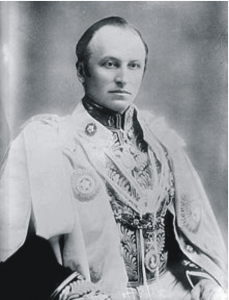
Grey, Sir Edward, (First Viscount Grey of Falloden) 1862-1933
Grey as Foreign Secretary in 1914
Grey was a liberal politician who served as Asquith’s foreign Secretary from 1905 to 1916, the longest continuous tenure of any person in that office. He opposed adding territory to the British Empire. He is probably best remembered for his remark at the outbreak of the First World War: “The lamps are going out all over Europe. We shall not see them lit again in our time“. He became Viscount Grey of Fallodon in 1916, he was Ambassador to the United States between 1919 and 1920 and Leader of the Liberal Party in the House of Lords between 1923 and 1924. Failing eyesight had forced him to retire from the House of Commons when Asquith’s coalition government fell in December 1916.
Herbert, Aubrey (1880-1923)
“The man who was Greenmantle”, he knew well the Ottoman Empire and its CUP leaders. (Committee of Union and Progress). Despite being nearly blind, he joined the army upon the outbreak of war and was wounded and captures during the retreat from Mons. After his rescue and subsequent recovery, he accepted a posting to Egypt as an intelligence officer, where he came to favour the Arab Revolt. But he always hoped for peace between the British and the Ottomans, and in 1917 tried to arrange it.
Hussein Ibn Ali 1853-1931
Hussein was appointed emir or Grand Sharif of Mecca by Sultan Amid II in 1908 and he led the revolt against the Ottomans in 1916. Despite his ambition to rule an Arab empire, the allies recognised him only as king of the Hejaz. (al-Hejaz, also Hijaz (Arabic: الحجاز al-Ḥiǧāz, literally “the barrier”) is a region in the west of present-day Saudi Arabia. Defined primarily by its western border on the Red Sea, it extends from Haql on the Gulf of Aqaba to Jizan. Its main city is Jeddah, but it is probably better known for the Islamic holy cities of Mecca and Medina. As the site of Islam’s holy places the Hejaz has significance in the Arab and Islamic historical and political landscape. The region is so called as it separates the land of Najd in the east from the land of Tihamah in the west).
Hussein abdicate this position in favour of his son Ali ibn Hussein(1879-1935) in 1924. In 1925 they both fled the Wahhabi warriors of Abdul Azziz ibn Saud. He spent the rest of his life in exile. Ali spent the rest of his life in Iraq, where his brother Feisal was king. (His second son was Prince Abdullah, Emir (later King) of Transjordan). Feisal ibn Hussein (1885-1933) was Hussein’s third son, leader and architect of the Arab Revolt, and king of Syria for 4 months in 1920, until expelled by the French. The British made him King of Iraq in 1921 but, since they held a mandate to rule from the League of Nations, Feisal’s Kingship was qualified. The British granted Iraq nominal independence since 1932.
This is how T.E.Lawrence described his first meeting with Feisal:
“I felt at first glance that this was the man I had come to Arabia to seek – the leader who would bring the Arab Revolt to full glory. Feisal looked very tall and pillar-like, very slender, in his long white silk robes and his brown head-cloth bound with a brilliant scarlet and gold cord. His eye-lids were dropped; and his black beard and colourless face were like a mask against the strange, still watchfulness of his body. His hands were crossed in front of him on his dagger.” Seven Pillars of Wisdom, p.76.
Kitchener, Field Marshal Horatio (First Earl Kitchener)1850-1916
A British soldier statesman, Kitchener served as Asquith’s secretary of state for war starting in August 1914. He was the one who initiated contact with Emir Hussein, offering the possibility of the caliphate if he sided with the allies in the war against the Central Powers, (specifically the Ottoman Empire) In early June 1916, he was killed on the way to Russia when his ship struck a mine.
Lawrence, Thomas Edward (1888-1935)
Lawrence in Arab dress at Ljidda
Lieutenant Colonel Thomas Edward Lawrence, CB, DSO (16 August 1888 – 19 May 1935), known professionally as T. E. Lawrence, was a British Army officer renowned especially for his liaison role during the Arab Revolt against Ottoman Turkish rule of 1916–18. The extraordinary breadth and variety of his activities and associations, and his ability to describe them vividly in writing, earned him international fame as Lawrence of Arabia, a title which was used for the 1962 film based on his World War I activities.
In January 1914, the archeologist Leonard Woolley and Lawrence were co-opted by the British military intelligence department as an archaeological smokescreen for a British military survey of the Negev Desert. They were funded by the Palestine Exploration Fund to search for an area referred to in the Bible as the “Wilderness of Zin”; along the way, they undertook an archaeological survey of the Negev Desert. The Negev was of strategic importance, as it would have to be crossed by any Ottoman army attacking Egypt in the event of war. Woolley and Lawrence subsequently published a report of the expedition’s archaeological findings, but a more important result was an updated mapping of the area, with special attention to features of military relevance such as water sources.
Eventually Lawrence made contact with Feisal (see above) and soon proved to be a “malevolent genius” at guerilla warfare. He left the Middle East thinking that Britain had betrayed the Arab struggle for independence.
McMahon, Sir Henry 1862-1949
A British political officer in India he replaced Kitchener as High Commissioner of Egypt. He carried on the delicate and much-debated correspondence with Emir (Sharif) Hussein that led to the Arab revolt. For this famous correspondence he is remembered . Lawrence commented on his “shrewd insight and tried, experienced mind,” that “understood our design at once and judged it good. “Seven Pillars of Wisdom,” p.41.
At the end of 1916 London replaced him in Cairo with Sir Reginald Wingate.
Milner, Alfred (First Viscount Milner)1854-1925
A leading British imperialist, he was part of the War Cabinet of Lloyd George. Whereas he supported the Zionists, he also supported a separate peace with the Ottoman Empire that might have left the Turkish flag flying over Jerusalem.
Montagu, Edwin (1879- 1924)
He was a Jewish anti-Zionist and liberal politician with close ties to Asquith. He earned the latter’s enmity by joining the Lloyd George coalition government. He led the opposition in the Cabinet to the Balfour Declaration: his view was that he had spent his life as a British citizen and did not want to return to a “Jewish Ghetto”. But just before the Cabinet came to a final decision, he had to leave the country to take up a post as Secretary of State for India.
Montefiore, Claude (1858-1938)
President of the Anglo-Jewish Association from 1896 to 1921 and an advocate of liberal (denationalized and deritualized) Judaism, he and Lucien Wolf fought hard against the Zionists and to maintain the longstanding connection between the British Foreign Office and advocates of Jewish assimilation.
Piçot, Francois Georges (1870-1951)
A French diplomat who, with Mark Sykes, redrew the map of the Middle East early in 1916, carving up the Ottoman Empire and basically allocating Syria, including Lebanon, to France and Mesopotamia to Britain. When they learn about this agreement neither the Arabs nor the British were pleased.
Rothschild, Edmond de (1845-1934)
A member of the French branch of the famous banking family, he believed in Zionism and supported Chaim Weizmann.
Rothschild, Walter (Second Baron Rothschild)1868-1937
The oldest son of Baron Nathan Mayer Rothschild, Walter inherited the title of the unofficial leader of the British Jewish community upon the death of his father. An extremely wealthy financier and far more interested in zoology, Walter Rothschild supported Zionism after falling under the spell of Chaim Weizmann. Balfour addressed the famous Declaration (promising British support for a Jewish homeland in Palestine) to Rothschild.
Sacher, Harry (1881-1971)
A journalist and a Zionist based in Manchester, Sacher provided his friend Chaim Weizmann with an introduction to his editor at the Manchester Guardian, C.P.Scott. He helped to found the iconoclastic British Palestine Society which Weizmann sometimes considered a thorn in his side. Nevertheless he played a key role in helping the Zionists frame the document that later became the Balfour declaration. C.P.Scott himself (1846-1932) was deeply impressed by Weizmann and introduced him to Lloyd George and other important British figures.
Samuel, Herbert (First Viscount Samuel)1870-1963
A Liberal politician who rose to become President of the Board of Trade and then Home Secretary in Asquith’s cabinet, he came from the “cousinhood” of wealthy, assimilated Jewish British, yet secretly nurtured Zionist beliefs. These he revealed to Asquith’s cabinet and to Weizmann early in the war; later he helped to bring Weizmann into contact with other important British officials. After the war he served as Britain’s first High commissioner in Palestine.
Sokolow, Nahum ((1861-1936)
Born in Poland, Sokolow was a leading official and representative of the World Zionist Organization who spent the war years in London where he was the chief collaborator of Weizmann. At the suggestion of Mark Sykes with whom he worked closely, Sokolow travelled to France and Italy during the spring of1917 and gained support from those countries for Zionist objectives. He was intimately involved from the Zionist side with the discussions that produced the Balfour declaration.
Storrs, Sir Ronald, (1881-1955)
He was serving in Cairo at the outbreak of war as the British High commissioner’s Oriental Secretary. He already knew Sharif Abdullah, (second son of the Grand Sharif of Mecca – see above), and was involved in the draft of the McMahon- Hussein correspondence. Later he joined the Arab Bureau and served as assistant political officer to the Anglo-French mission of the Egyptian Expeditionary Force and as military governor of Jerusalem.
Sykes, Sir Mark (6th Baronet) 1879-1919
Having travelled and written about the Ottoman Empire and the Middle East before the war, he was assigned to the de Bunsen Committee by Kitchener, and then sent by him to survey the Middle Eastern scene in person. Sykes negotiated the Sykes-Picot and Tri-partite agreements, dividing up the Ottoman Empire. He then converted to Zionism and played a crucial role in promoting its leaders. He envisioned a remade Middle East based upon the autonomy of the small nationalities, most particularly Jews, Arabs and Armenians. He died alone in a hotel in Paris from Asian flu in 1919.
Talaat Pasha 1874-1921
A Military office, member of the CUP, (=Committee of Union and Progress), he was the third member of the triumvirate that ruled in Ottoman Empire in World War1. In 1917 he became Grand Vizier (Prime Minster). He kept the door open for separate peace talks with Britain, and, without informing Enver (=Enver Pasha, 1881-1922) or Djemal (=Djemal Pasha 1872-1922, who was assassinated by an Armenian revolutionary), made more than one overture to the British in 1916-1917. He died in Berlin at the hands of an assassin.
Weizmann, Chaim (1874-1952)
Weizmann in 1918 with King Faisal of Iraq, (see above)
Weizmann was born in Russia, in Motol, now Belarus, but then in the “Pale of Settlement”, that area of Russia to which the Jews had been confined since the time of Catherine the Great. From an early age he became interested in chemistry and managed to study in Berlin and then Freiburg in Switzerland. He met his future wife Vera Chatzman in Switzerland. He was the whole time seeking for ways to realise the Zionist dream. Theodor Herzl’s death was a huge blow to him and he left for England in 1904 where he became a chemistry lecturer at the University of Manchester and soon became a leader among British Zionists.
During the war he became the leading Zionist in Britain and played the most important role from the Zionist side in fashioning the British –Zionist Alliance and the Balfour Declaration. He became the first President of Israel in 1948. (See biography on this website)
Wolf, Lucien 1857-1930
A journalist and expert commentator on British foreign affairs, he came to dominate the conjoint committee of the Anglo-Jewish Association and Board of Deputies of British Jews. One aim of these bodies, and of wolf, was to persuade British policy makers to defend and support Jewish interests outside Great Britain. He believed in Jewish assimilation and took a leading role among Jews in Britain who opposed Zionism.
Zaharoff, Sir Basil (1849-1936)
Of humble origin, Zaharoff attained great wealth as an arms dealer and rose to membership on the board of directors of the Vickers armaments manufacturing. He played a key role in engineering Greek entry into World War 1 on the side of the Allies and served as Lloyd George’s emissary to the Ottomans in search of a separate peace.
Sources include:
Jonathan Schneer, The Balfour Declaration, (Bloomsbury 2010;
Wikipedia;
T. E. Lawrence, Seven Pillars of Wisdom,
Stephen Sizer, Zion’s Christian Soldiers,
Geoffrey Lewis, Balfour and Weizmann: the Zionist, the Zealot and the Emergence of Israel,(Continuum 2009).

